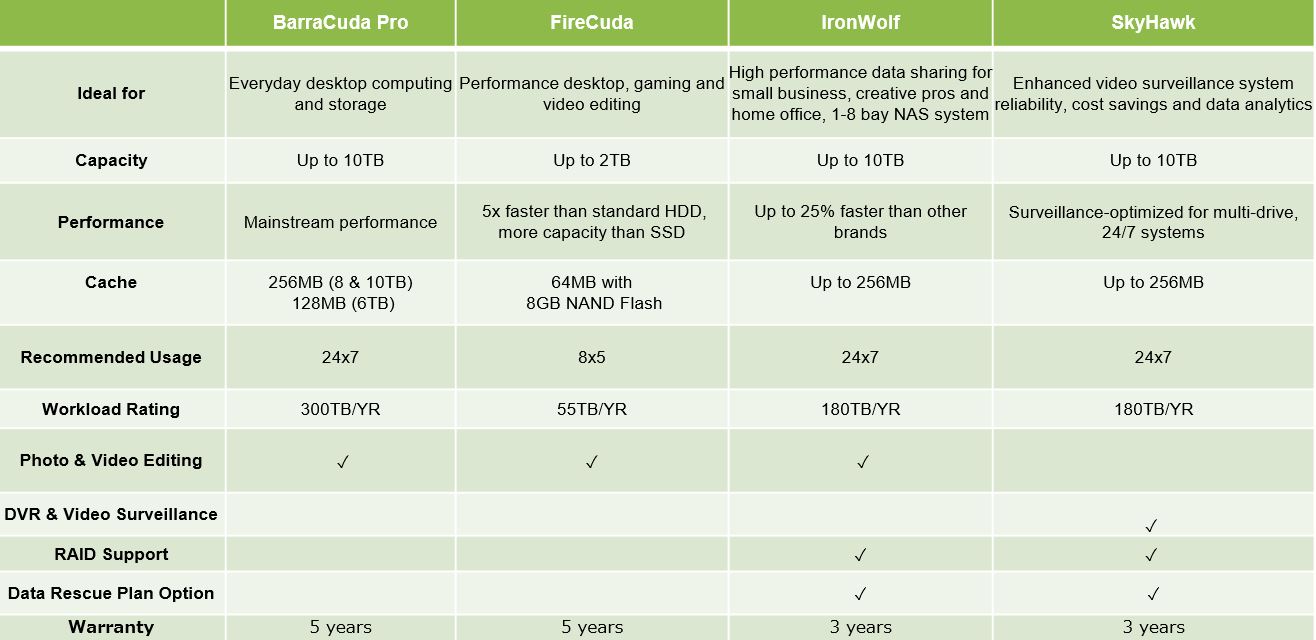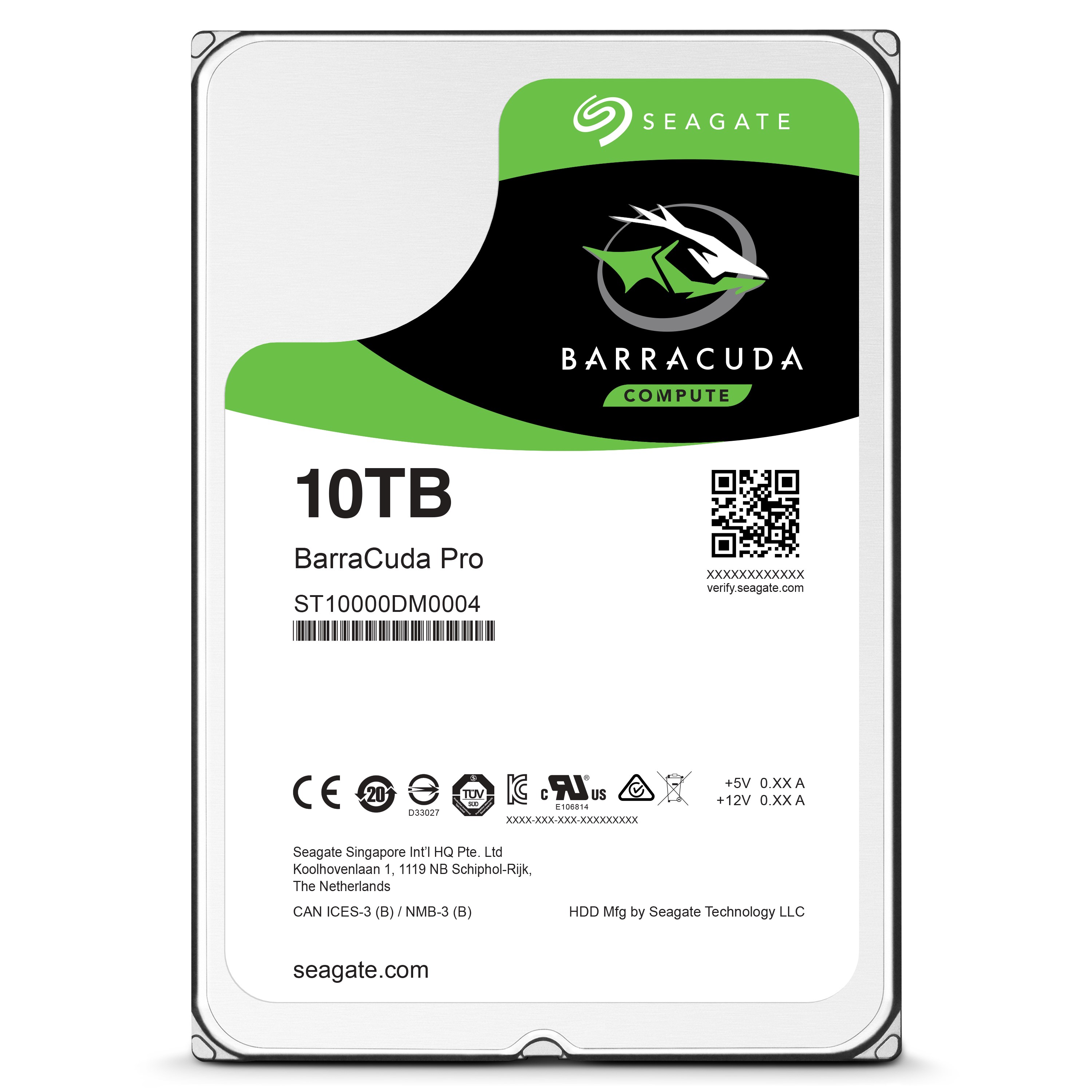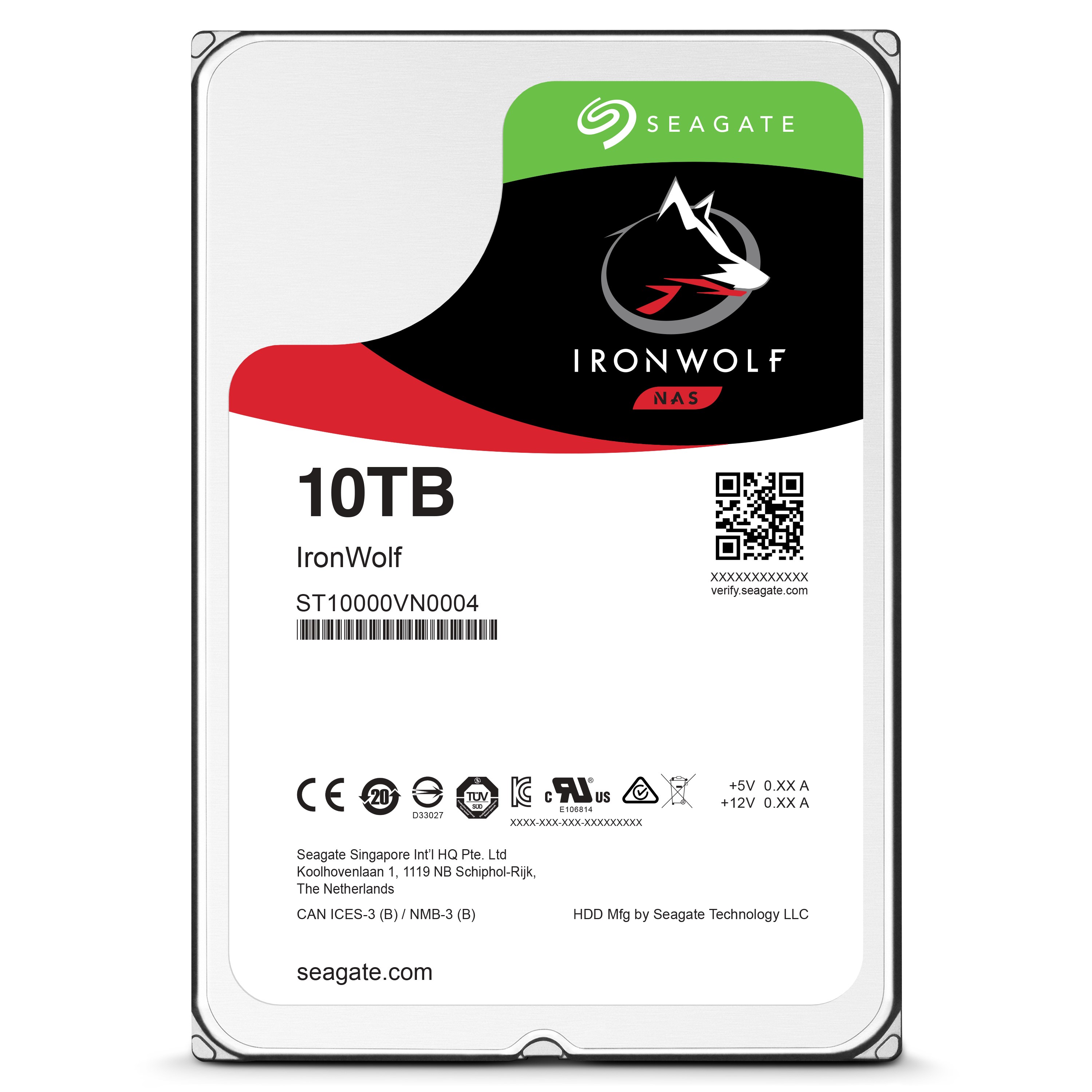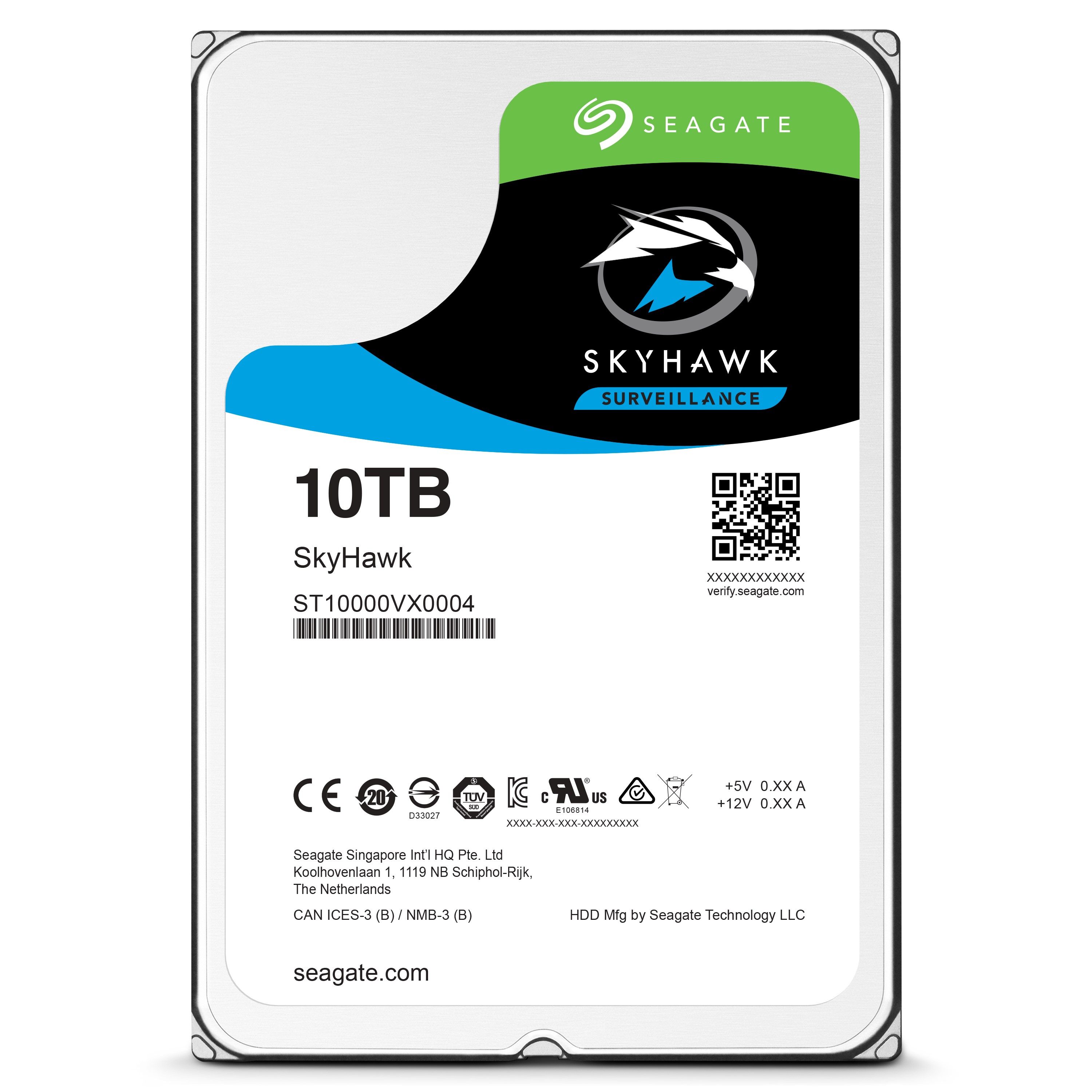Seagate Announces 10TB Consumer HDD Lineup With Five Year Warranty
Seagate unveiled its new 10 TB helium-powered Guardian Series range of HDDs. The series includes the 10 TB Seagate BarraCuda and Barracuda Pro HDDs for desktop PCs, the IronWolf for NAS and the SkyHawk for surveillance environments. Seagate also threw in a speedy FireCuda SSHD, but its capacity is limited to 2 TB.
All of the new offerings feature conventional PMR technology, and Seagate extended some enterprise-class features and market-leading warranty periods to several of the new consumer products.
BarraCuda and BarraCuda Pro
Seagate abandoned the BarraCuda naming convention a few years ago, but it is back with the unveiling of the BarraCuda and the BarraCuda Pro HDDs. Both products offer a 10 TB model that uses a helium design with 7 platters and 14 heads, while lower capacity models have standard air-based designs and varying head/platter counts.
The BarraCuda Pro is the more attractive of the two models, largely because it is faster than the standard BarraCuda model. The Pro comes in the 3.5" form factor at 6, 8 and 10 TB capacities, spins at 7,200-RPM and features a 5-year warranty. The 10 TB of capacity is impressive because it is the largest desktop HDD on the market (displacing the Toshiba 8 TB X300), but the five-year warranty period is even more impressive.
HDD vendors abandoned long warranty periods for consumer-class HDDs in the wake of the supply-restricting 2011 Thailand floods. The "new normal" for desktop PC HDDs is two years, which the BarraCuda Pro more than doubles. The WD Black, which tops out at 6 TB, also offers a five-year warranty. Seagate has the majority of desktop market share (at 43 percent Q1 2016), but it has been the subject of persistent accusations of poor quality. This is due, in part, to the Backblaze HDD reliability reports, so Seagate likely geared the warranty extension to address those reliability concerns in the desktop/enthusiast space. In either case, the five-year warranty could spur other vendors to reciprocate in the broader desktop HDD segment.
HDDs have workload ratings, which are an endurance meter that indicates how much use the vendor designed the drive for. The BarraCuda Pro breaks new ground with a 300 TB-per-year workload rating. Seagate also designed the Pro to withstand 24x7 use, while most companies design standard desktop models for 8x5 use-cases. From outward appearances, the 10 TB Pro model is very similar to the Seagate Enterprise Capacity 10 TB drive, albeit with the removal of a few enterprise features.
The Pro uses Seagate's Multi-Tier Caching (MTC) technology, which boosts random write performance significantly. The Pro model also features a relaxed 1 per 10^14 error rate compared to the enterprise models (standard for desktop HDDs). The Pro employs a 256 MB buffer on the 8 and 10 TB models and a 128 MB buffer on the drives with less capacity. Seagate indicates that the Pro offers up to 220 MB/s of sustained sequential transfer speed.
Get Tom's Hardware's best news and in-depth reviews, straight to your inbox.
Seagate designed the standard BarraCuda model, which comes in 2.5" (500 GB to 2 TB) and 3.5" form factors (500 GB to 4 TB), for the regular 8x5 use-case. It features a 55 TB-per-year workload rating and does not include the performance-boosting MCT technology. The standard model slots in as the value-centric offering and comes with the standard two-year warranty and a 5,900-RPM spindle speed.
The 10 TB BarraCuda Pro debuts at $534.99, while the standard BarraCuda 2TB and 3TB models retail for $80.99 and $99.99, respectively.
FireCuda
The FireCuda appears to be a new spin on the old SSHD jam, and it comes in 2.5" (1TB) and 3.5" (1, 2 TB) flavors. The drive only carries 8 GB of flash, which is curious because Seagate's latest Desktop SSHDs employ up to 32 GB of flash. The drives feature an upgrade to a five-year warranty, however, which might make them a competitive entry in the entry-level performance segment. The FireCuda 1TB and 2TB models retail for $84.99 and $109.99, respectively.
IronWolf And IronWolf Pro NAS HDDs
The IronWolf NAS HDDs bring helium to the Seagate NAS platform with a wide range of capacity points that span from 1 TB to 10 TB. The IronWolf drives feature a standard three-year warranty and a 180 TB-per-year workload rating, both of which are less desirable in comparison to the BarraCuda desktop HDDs. However, the IronWolf series features AgileArray NAS-optimized firmware (for RAID applications), dual-plane balancing, advanced power management and the notable addition of RV (Rotational Vibration) sensors.
Seagate added the RV sensors on the 6, 8 and 10 TB models to help the drive sense, and thus counteract external vibrations. RV sensors increase durability and reliability in multi-drive environments. HDD vendors typically restrict RV sensors to enterprise-class HDDs, so the addition is a significant improvement for smaller consumer-oriented NAS. No other NAS drive for 1 to 8 bay devices offers RV sensors.
The IronWolf HDDs are good for up to 8-bay deployments and feature an industry-leading 256 MB cache. Seagate also offers its Seagate Rescue as an optional "just-in-case" data recovery insurance.
The 10 TB IronWolf has a $469.99 MSRP. Seagate is launching an IronWolf Pro in the fall, but we do not have details yet.
SkyHawk Surveillance HDDs
Seagate also introduced 10 TB helium HDDs to the surveillance space. Surveillance HDDs feature optimized firmware that reduces dropped frames in multi-stream recording environments (up to 64 cameras simultaneously) and are designed to operate 24x7. The drives feature RV sensors, a 180 TB-per-year workload rating and a three-year warranty. The 10 TB SkyHawk retails for $459.99.
What It All Means
Seagate is planting its 10 TB helium flag in the ground in several segments that its competitors have not addressed with 10 TB drives. The desktop PC drives do come at a premium, but Seagate is currently the only game in town for a 10 TB desktop HDD, not to mention a 10 TB with a five-year warranty.
The five-year warranty periods are a welcome sight in the desktop segment. Only 10 percent of shipping desktop PCs come with an SSD, and that is not projected to change radically any time soon. This means that the desktop segment is still a competitive market for the HDD vendors, and we can expect others to respond in kind with 10 TB HDDs with longer warranty periods soon, which should also help reduce prices.
Seagate also has SMR HDDs shipping, which utilizes a new denser recording method to store data than its new 10 TB HDD platform. The addition of SMR technology to this same helium platform could provide 12+ TB HDDs in the very near future.
Edit: July 20, 2016, 9:15 AM: Amended article to include WD Black as another HDD with five-year warranty period.

Paul Alcorn is the Editor-in-Chief for Tom's Hardware US. He also writes news and reviews on CPUs, storage, and enterprise hardware.
-
Tanyac The problem with Seagate's Barracuda drives is that they are largely unreliably. Of the 100 or so I've purchased in the last 5 years, all but a dozen have failed within or just outside the warranty period. Whilst Seagate have always replaced the drives, the risk of data loss is substantial, and it's costly to keep sending drives back to the distributor.Reply
The 5 and 6 TB offerings are unaffordable and priced so far outside the economic replacement boundary, that to adopt those drives is a massive cost of replacement, for a tiny or no increase in total capacity.
$470 USD should translate to $626 AUD, but we here in Australia get exploited with tech pricing all the time (Just look at the $1649 price tag on most resellers for the I7-6900K). It'll be more likely that the drives will retail here for $750 - $800 each, making them a ridiculous investment, even with a mediocre warranty period of 5 years. -
stevenrix I'll never go with Seagate again:Reply
- all my seagate drives failed in less than 1 year
- when seagate replaces the drives, they usually fail also over a few months period
- One time i got a drive that failed in barely 1 week
- 10 Tb price point is too costly ($574? Are you kidding me??). I will probably stay with the 4 Tb drives for a long time then. -
jimmysmitty Reply18302774 said:The problem with Seagate's Barracuda drives is that they are largely unreliably. Of the 100 or so I've purchased in the last 5 years, all but a dozen have failed within or just outside the warranty period. Whilst Seagate have always replaced the drives, the risk of data loss is substantial, and it's costly to keep sending drives back to the distributor.
The 5 and 6 TB offerings are unaffordable and priced so far outside the economic replacement boundary, that to adopt those drives is a massive cost of replacement, for a tiny or no increase in total capacity.
$470 USD should translate to $626 AUD, but we here in Australia get exploited with tech pricing all the time (Just look at the $1649 price tag on most resellers for the I7-6900K). It'll be more likely that the drives will retail here for $750 - $800 each, making them a ridiculous investment, even with a mediocre warranty period of 5 years.
But you are putting in personal opinion/experience as fact when the truth is that Seagates are about as reliable as most other brands. My best experience is when I worked in a repair shop. The worst we had were the HGST and Toshiba 7mm 2.5" HDDs but other than that none were more reliable than the others if you compares apples to apples, i.e. entry level to entry level and so on and not consumer to enterprise or high end to low end.
Then there is pricing. There is no Consumer end 8TB or 10TB from HGST who makes good drives. Closest is their 8TB enterprise drive that is around $480 bucks for a OEM drive.
Then there is WD. Again closest is 8TB and it is their NAS drive which is cheaper but also is slower and smaller.
Both have lower warranties, unless you go to the WD Red Pro (couldn't find one for sell on Newegg) which has the same as the Barracuda Pro.
I think it is good. Until SSDs become much cheaper and much larger this is the best way to get storage space and this 10TB HDD will help push down the $/GB and hopefully push competition because you can't have just one company.
18303219 said:Awesome! Can't wait for WD to release their superior version. :-)
If by superior you mean a HDD with probably about the same failure rate as the other major HDD manufactures then yes. -
thundervore I personally lost 8TB to Seagate drives. All 4 2TB drives failed right after the 1 year warranty was up. I replaced them with Toshiba DT01ACA200 drives and they are running strong 3 years later. Even my 4 2TB Samsung HD204UI drives from over 4 years ago before the flood that drove up HDD prices are still running strong with zero issues according to HD Sentinel.Reply
We have many WD Blue drives at work and they always die, but its covered by the OEM so we just call them and they send a new drive and we send the old one back. Rinse and repeat.
Ive also personally lost 3 WD Black drives to the click of death right after the warranty expired.
Personally I prefer to vote with my wallet and I know from MY experience I will never buy a Seagate drive or a WD drive. So right now it Toshiba and it must have at least a 3 year warranty, nothing less! -
alextheblue My personal favorite desktop drives were Fujitsu (before Toshiba bought them) followed by Hitachi (pre-WD) and Samsung (pre-Seagate). WD's higher-end drives have typically been decent (Red, Purple, sometimes Black) as long as they were adequately packaged. Maxtor and Seagate have been the worst overall, but low-end WDs aren't too hot either.Reply
Maybe it's just bad luck, or experience with OEM-grade drives, but I am just way too gunshy. An improved warranty won't be enough for me to use a Seabomb HDD again any time soon. Maybe ever. Solid state might be cost-viable for secondary storage by the time I am willing to give them a shot again. -
Tanyac Reply18303467 said:But you are putting in personal opinion/experience as fact when the truth is that Seagates are about as reliable as most other brands.
Of course I am quoting from experience. But not only. I spend a lot of time reading research about storage technologies (as well as other stuff). I've certainly had problems with WD drives too, but that is not the subject of this article.
I'm no data center, but I do run servers for community organizations that cannot afford down time or data loss. Seagate used to be my first choice, but I can't in good conscience trust the drives after the experiences I've had.
And it's not as if I just "got a bad batch", I've had the same experiences since 2010, with an ever decreasing reliability since then and with a significant decline since 2013
"Experience" is fact. I'm not randomly quoting rhetoric for the sake of starting arguments about the topic. The fact is, I and customers I have built systems for consistently experience significantly more Seagate failures that any other brand. That is not to say other brands don't fail too.
I have found Seagate drives tend to have more controller failures as opposed to WD which tend to more mechanical failures.
Now, to be fair, WD drives are more expensive that Seagate. One would hope that extra cost translates into something tangible, like better endurance. However, the economic curve for them is even worse than for Seagate, at least here in Australia where prices are inflated.
-
captaincharisma no thanks seagate, i'd buy a Toshiba HDD over your brand any day and they are almost as badReply -
jimmysmitty Reply18303859 said:18303467 said:But you are putting in personal opinion/experience as fact when the truth is that Seagates are about as reliable as most other brands.
Of course I am quoting from experience. But not only. I spend a lot of time reading research about storage technologies (as well as other stuff). I've certainly had problems with WD drives too, but that is not the subject of this article.
I'm no data center, but I do run servers for community organizations that cannot afford down time or data loss. Seagate used to be my first choice, but I can't in good conscience trust the drives after the experiences I've had.
And it's not as if I just "got a bad batch", I've had the same experiences since 2010, with an ever decreasing reliability since then and with a significant decline since 2013
"Experience" is fact. I'm not randomly quoting rhetoric for the sake of starting arguments about the topic. The fact is, I and customers I have built systems for consistently experience significantly more Seagate failures that any other brand. That is not to say other brands don't fail too.
I have found Seagate drives tend to have more controller failures as opposed to WD which tend to more mechanical failures.
Now, to be fair, WD drives are more expensive that Seagate. One would hope that extra cost translates into something tangible, like better endurance. However, the economic curve for them is even worse than for Seagate, at least here in Australia where prices are inflated.
Experience is only fact in so it applies to you. As I said I worked at a repair shop, well a parts store to the only one in Tucson, and of all the drives we sold we have similar failure rates between brands for every one sold. I can tell you in a year we sold a couple thousand including all makes, models and the ones we put in our pre-build systems. That only applies to me. I can point to my own personal builds with Seagates that were almost over 10 years old still going strong but again that applies to only me and is in no way a fact of the quality of any HDD.
I have yet to see any 100% accurate testing as the sample size is either too small or the methodology is flawed. It also depends on the line as there are some lines of Seagates that have a super low failure rate and others that have a higher failure rate, same with WD/Hitatchi etc.
A funny thing is that a lot of people use the "Backblaze" data yet if you check it every year the brands go back and forth. For 2015, or the most recent report, WD is the worst and Seagate has a very good (low) failure rate. Best is HGST but I guarantee that HGST doesn't sell nearly as many HDDs ans WD or Seagate.
To each their own. We need some good size jumps that helps drop the $/GB however I would rather see 10TB SSDs at near or less $/GB instead.



